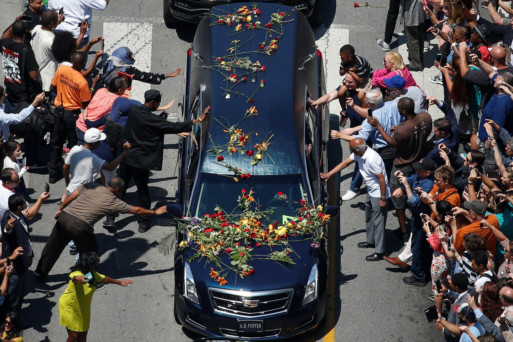
The Greatest, who passed away earlier this month, had a recurring dream that his daughter Hana wrote about. “When he was younger he said, ‘I used to dream that I was running down Broadway in downtown, Louisville, Kentucky, and all of the people were gathered in the street waving at me and clapping and cheering my name, then all of a sudden I just took off flying’.”
A night before Muhammad Ali’s funeral, my son Faisal and I flew into Louisville, where Ali’s body was brought back for burial, to pay our homage to ‘The Greatest’. We lined up among thousands outside his childhood home to pay our respects as his funeral cortege passed through a 19-mile (30.5km) route. We had the unique honour of listening to childhood memories from some of his neighbours. We also went to places that defined his early life, like his school, his boxing gym and the building in which they decided to call him for the draft. We were among the first to pay respects and pray at his graveside when it was opened to public the following morning.
While much is written about Ali’s active boxing years, little is known about his life circumscribed by Parkinson’s for 30 years. He devoted this time to inter-faith harmony and philanthropy. Publicly, as privately, he carried his burden with the same courage that saw his epic fights with other heavyweights.
He was, fittingly, chosen to light the Olympic flame at the 1996 centenary Olympics in Atlanta, and in a final act of recompense, Ali was awarded the Presidential Medal of Honour, the highest United States award, in 2005. He went from being the most reviled person in America to one of its most celebrated citizens without compromising his principles.
At the memorial service attended by more than 20,000 people, in which we had the honour of participating, the speeches, not reflected in the media coverage, were an unmistakable expression of black America’s anger against centuries of injustices and deprivation suffered at the hands of white America. Ali’s wife Lonnie, remembering the prejudices and Ali’s induction into boxing by a (white) policeman, Joe Martin, remarked: “America must never forget, when a cop and an inner-city kid talk to each other, miracles can happen.”
Kevin Cosby, pastor of Louisville’s St Stephen Baptist Church, gave a rousing recollection of Ali’s importance to the black community. “He dared to love America’s most unloved race,” and added, “while he is the property of all people, let us never forget, he is the product of black people, and their struggle to be free.”
Bryant Gumbel, one of America’s foremost sports writers, believed that the civil rights movement in America went forward largely because of Ali, as African-Americans overcame their fear. Ali encouraged millions to believe in themselves, raise their aspirations and accomplish things that they might not have done without him, said Gumbel.
Ali, we heard at the memorial once said: “Service to others is the rent you pay for your room on earth.” In an emotion-filled eulogy, John Ramsey, a radio journalist and a family friend, choked up at the end of his speech, saying, “Champ — you’ve paid your rent in full, you’ve paid your rent in full, you’ve paid your rent in full.”
Days after Ali’s burial, in an act of atonement, Louisville’s leading paper, the Courier Journal, formally apologised after 50 years of “an oddly hostile approach on the specific issue of Ali’s name, which did little to help race relations in a turbulent time”. For years the paper had insisted on calling him by his birth name, Cassius Clay (he changed it to Muhammad Ali in 1964 after joining the Nation of Islam).
After our two-day trip to Louisville and visiting many places connected to Ali’s life, I have come to believe that the more we know him, the less we know of him. Boxing was only a small part of his life.
He was a poet, an outspoken champion of black civil rights, a revolutionary, a philanthropist and more. The genius of his talent was extraordinary. Ali decided he would never be disempowered, said former US president Bill Clinton. He was the living embodiment of the proposition that principles matter. He was the finest example of a human being. We are honoured to live in the time of ‘The Greatest’.
Ali Centre in downtown Louisville, which we had the honour of visiting, exhibits the life and achievements of Ali. One of the first displays is a signed sheet from Ali: “After me there will never be another.” So true.
On Friday, June 10, in Louisville, Ali’s funeral cortege passed through the same Broadway amid the unprecedented crowds waving, clapping and cheering his name. As the cortege drove into Louisville’s Cave Hill Cemetery, just as he dreamed, he took off flying, hopefully into the heavens. His wife Lonnie poignantly remarked: “While it’s not my judgement to make, I believe he’ll get there.” Inshallah (God willing).
Sajjad Ashraf is an adjunct professor at the Lee Kuan Yew School of Public Policy, National University of Singapore. He was a member of the Pakistan Foreign Service from 1973-2008 and served as Pakistan’s consul general in Dubai from 1996-1998.









